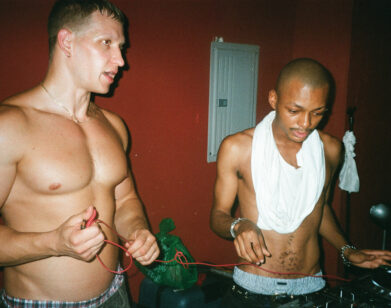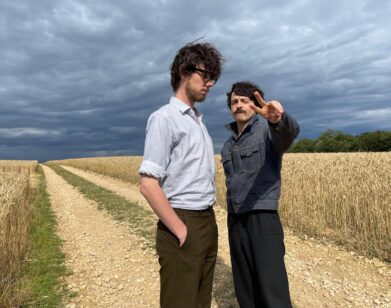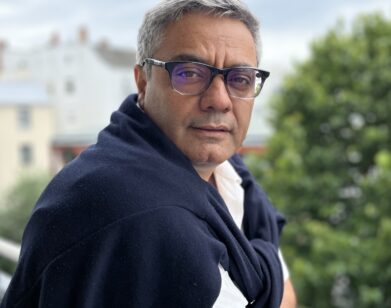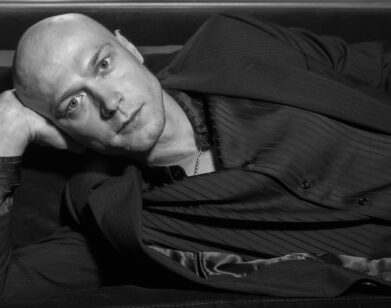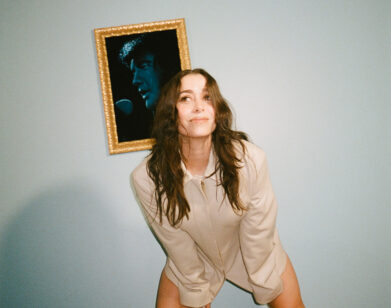Marisa Tomei and Lisa Bonet Have a Rich and Delicious Conversation
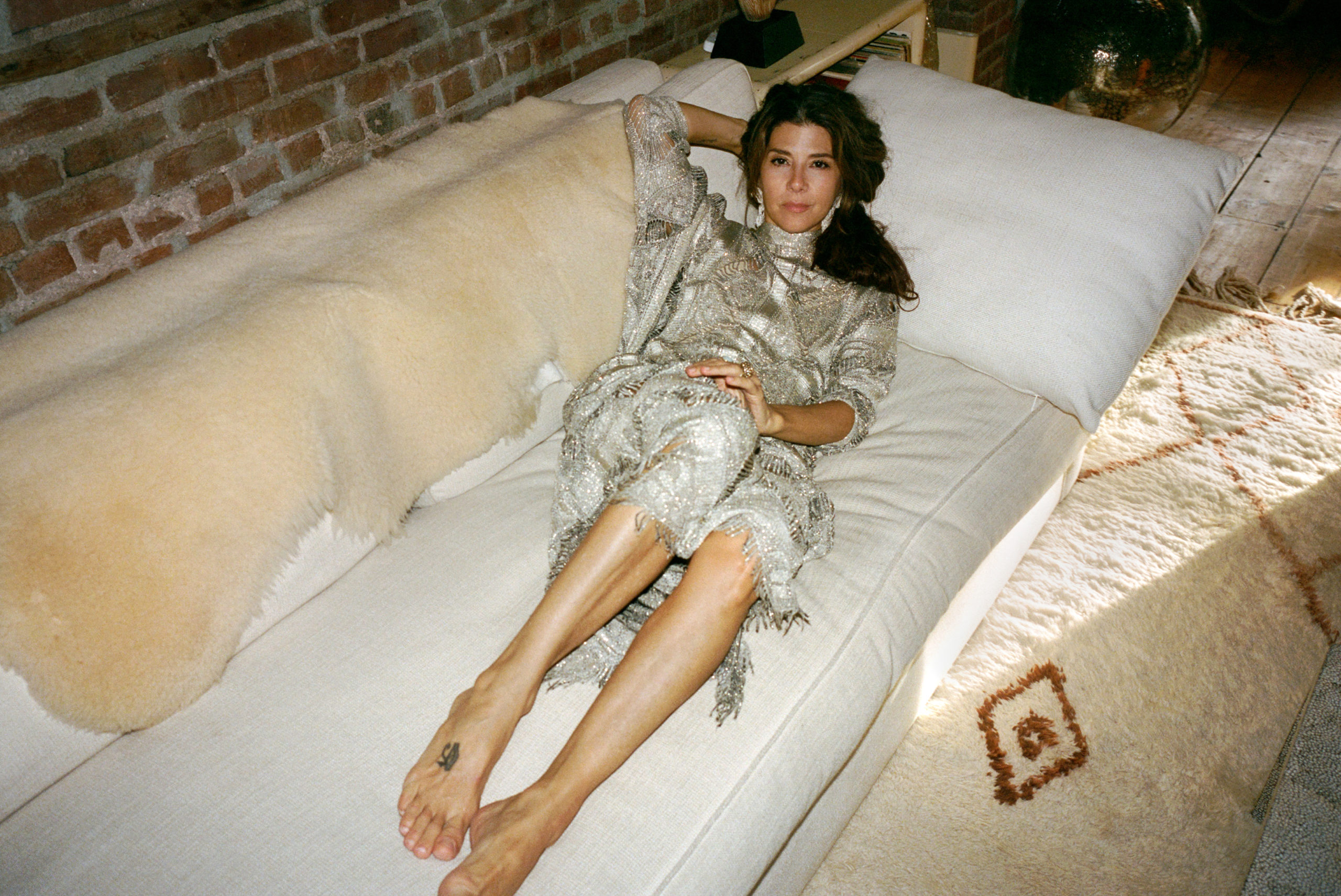
Vintage silver knitted dress Stylist’s own. Earrings and ring by Arielle de Pinto.
Back in 2017, the news that Marisa Tomei would be playing the role of Aunt May in Spider-Man: Homecoming, came as a surprise. As Peter Parker’s guardian, Aunt May has typically skewed older, more grandmother than aunt. Tomei’s casting signaled that this version of Spider-Man, led by Tom Holland and Zendaya, was bringing a youthful energy to the proceedings. Five years later, the franchise’s third installment, Spider-Man: No Way Home, single-handedly saved the movie business, and established Tomei’s character as its emotional core. And why not? Ever since her 1992 Oscar win for My Cousin Vinny made her a household name, the 57-year-old Brooklyn native has enjoyed one of the highest Q ratings in Hollywood, a universally beloved performer who automatically lifts up any project she appears in. One of those projects was A Different World, the late-’80s Cosby Show spinoff that helped launch her career. It was also where Tomei first met the actor Lisa Bonet, who, after more than three decades together in the entertainment industry, has been a constant source of support and affirmation. Earlier this month, they reconnected.
———
TOMEI: Hi, babe. Let’s just giggle at each other for a little while.
BONET: Giggle at the jackpot of a lifetime that we’re still giggling with each other. My goodness.
TOMEI: We do generally start with some giggles. The jackpot of many lifetimes.
BONET: We’ve always generated some good chuckles.
TOMEI: I’ve recently updated my password, so it’s no longer Yogini clown, which was what it was for a while, which reminds me of us.
BONET: What a world.
TOMEI: There’s so much to say, it’s almost like, why even say anything? Better just to be in awe of what’s unfolding.
BONET: Yeah. How to put into words the unspeakable? Well, how about this? How have you changed in this epic transition?
TOMEI: I have been healthy and feel grateful for that. I actually appreciated very much the slowing down of a lot of the extraneous noise in my life—not being on a plane all the time, just getting to have my roots. I became a bit of a country mouse, and have been going up north closer to you, as you know. But what you don’t know is that I finally got a little house up north, so I really am becoming a country girl. And getting to be more in nature.
BONET: This is wonderful news.
TOMEI: Yes. It’s been a long time coming. I’ve felt the pull for so long, but I do get distracted by those city lights and dance floors and the satin dresses to be worn. But I’ve found so much solace and joy in the trees.
BONET: And the birds.
TOMEI: So, that’s one of the larger changes. I also had way more time to meditate. I had meditated for years and years—you brought that into my life after Phylicia Rashad taught you. During this time it’s been such a deep pleasure to meditate for longer and longer stretches, and feel my body unwind. A real layer of noise seems to have peeled off.
BONET: The more still we are, the more clearly the guidance comes through in these very uncertain times.
TOMEI: Also, all this revolution that’s going on is something I’ve been talking about for a long time. I honestly didn’t think I’d see this much change in my lifetime, this much calling on the powers that be, this much tearing down of the old paradigms. It’s really heartwarming, and it brings me to tears. It’s not an easy process, but I’m really filled with joy that there’s so much waking up happening.
BONET: Yeah. The revolution is definitely here and we’re all feeling the squeeze. If you aren’t, you’re in total denial, and the more you resist, the more you will suffer. Everything is crumbling out there. The personal work is understanding where empire and those archetypes live within us. The revolution is on the inside, and learning to be new in this new world.
TOMEI: Luckily we have the giggles in between.
BONET: Being the naturalists that we always have been, the thrill of the hunt has always been a very satiating experience for us. We often find that at the flea market.
TOMEI: We’d go to the flea market together and be so turned on by the vintage clothes. We’d have our days where we’d come back to the house, and realize we’d chosen the same clothes.
BONET: Maybe there was a little variation in color or something, at most.
TOMEI: I loved that so much. I’m still an avid vintage girl.
BONET: Yeah. I’m devoted as well.
TOMEI: I love finding those treasures.
BONET: I mean, I’m a total repurposer, so finding another life for something, and letting it live on is so satisfying. And then, knowing an object’s history and craftsmanship, and you’ve got me hooked.
TOMEI: And also the ritual of it. I love that. Even in dance class, I wore the same skirt every week because I really felt that it was collecting energy.
BONET: I think fashion can become so performative in many ways, or just misused. It’s so important to look and feel like nobody but yourself.
TOMEI: It’s self-expression. This means something to me and I want to share it. When you’re talking about fashion, how can it be used more for beauty than for commercialism? Beauty is so important because it really stops us from thinking. It makes space for that transcendence.
BONET: And I think beauty actually heals. How are you nourishing yourself these days? Do you believe in breakfast?
TOMEI: My feelings about breakfast have changed over the years. I used to get up and have a good big breakfast, but it doesn’t suit my system anymore. Now I have some tea, and I eat something around 11. I like a mushy banana with some almond butter, and I throw some cinnamon on that. Or some really nice, grainy, seeded bread.
BONET: Toasted with butter?
TOMEI: With a little coconut oil and an egg. But the egg is very specifically a seven-minute egg. I only learned that I like a seven-minute egg when I was shooting. I was in Bosnia with Eve Ensler for The Vagina Monologues. We had gone there to do it with women in Sarajevo. It was a whole multicultural experience, but my hotel didn’t have much for me to eat. Every day I’d ask for an egg, and I didn’t speak the language, so sometimes it would come hard and sometimes it would be super soft. Rhat’s how I learned. Like, “Let’s try five minutes. Let’s try six. Let’s try seven.” And when I landed on seven, I never looked back. It’s a jammy egg.
BONET: With a little olive oil and sea salt?
TOMEI: Yeah. I like a big lunch and a smaller dinner. What about you? I don’t know your breakfast habits. We used to have more sleepovers. We’ve got to get back to that.
BONET: I have a tendency to wait before I put a lot of food in my stomach, but I have to honor that my body needs food probably sooner than I give it to it. And you know, acidophilus always, ION Biome always. I was a diehard mate drinker for a long time and I still am, but I’m starting a little softer now.
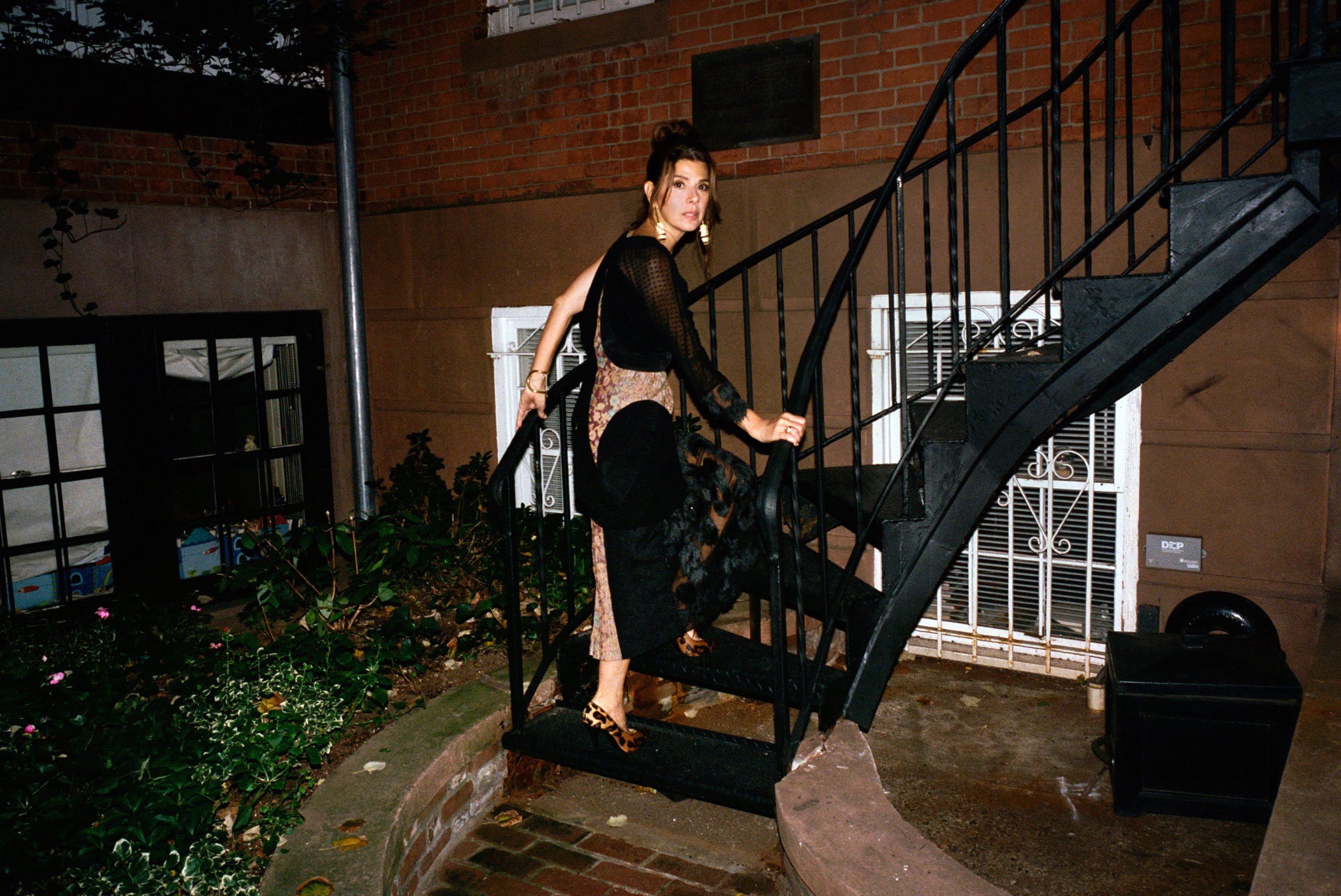
Matar dress and Matar earrings Stylist’s own. Cuff and Ring by Arielle de Pinto. Shoes by Christian Louboutin (model’s own).
TOMEI: That’s a nice ritual with the mate, though.
BONET: Yeah. With the gourd, the bombilla, I love it. Although I do think that I’m now getting little wrinkles around my lips from the straw.
TOMEI: Let’s not go down that road. The straw took her down. No, we shall not have that.
BONET: I’ve been really into soaked oats with oat milk and chia seeds, walnuts. I can just graze on that for half a day.
TOMEI: When we last left off, we were on the mung beans.
BONET: And then bone broth, we both live on bone broth. I’ll scramble an egg in coconut oil and throw the bone broth over that. And that is very sustaining with some lovely sourdough and some beautiful cultured butter. That’s very happy body food for me.
TOMEI: You and I have been vegetarians together. I don’t think either of us are at the moment.
BONET: Not exclusively. I’ve eliminated more red meat. I think it got me through a lot, and put some strength in my step after having two children later in my years. I do very little fish because as you may remember, I had heavy metal poisoning.
TOMEI: Yes. That was a long detox. You always teach me so much. We’ve both always been very in touch with our bodies and have relied on them for wisdom. I’m laughing because I can remember the first moment we met, and it was a very physical moment for me. The moment that I recall was in Dan Fossey’s class. We were in that acting class and he had us bent over at the waist and hanging upside down and you were to my right. I looked over, and it was like the meeting of two fools hanging upside down. I just thought, “Oh my god, I love her.” It was like magic.
BONET: It really was as simple as that.
TOMEI: We had so many, and continue to have so many similar interests. It is a blessing to be able to keep growing together and going through these changes together.
BONET: Yeah. My dance moves are a lot more mild.
TOMEI: I don’t believe it.
TOMEI: It was just my birthday. And I made sure to dance on my birthday, too. Pure joy.
BONET: That’s the pursuit, isn’t it? Allowing for joy. I think so much of youth is driven by ambition, but now it really feels different.
TOMEI: Sometimes I feel like, “Where’s that spark? I just don’t have that anymore.” I don’t, but that’s okay. It’s actually a relief not to have that as much, but I do notice it.
BONET: What calls to you?
TOMEI: The trees, for sure. I would love to do a documentary about female spirituality, because I got really invested when I did Oscar Wilde’s play Salome. I want there to be a more robust discussion around that. What’s calling you?
BONET: Definitely learning how to be authentically me, learning to be new, and following this invitation from the universe to step into this river of uncertainty. We’ve eliminated all this extra noise, and now it’s time to grow our roots deeper into our own values.
TOMEI: Yeah. Taking that risk to connect and to communicate from that place. It’s definitely been a process for me to find my voice, to speak true words from my heart. I do that, but I have a lot of anxiety, so I appreciate the quiet. I feel like there was always some kind of rush happening in my household when I was a kid. I’m used to hopping to it and running. Slowing down is the simplest thing, but it’s really done profound things for me.
BONET: I think that’s a lot of what we’re shaking off, because it’s what we’ve been indoctrinated in, it’s how our culture defines worth. Our worth is based on how much is scheduled on your calendar. You have the new Spider-man movie coming out, so let’s talk about spiders. Do you have any good stories?
TOMEI: I think a lot about a particular indigenous teaching involving the spider, and the spider being female, and her knowledge that we’re all connected. That’s what I think Spider-man learns from my character. She carries that knowledge that we’re all connected locally, and acting locally is something she passes on to Spider-man. That’s why he’s a community hero, a local hero.
BONET: We love infusion of some folklore, because it just adds so much depth and meaning. We have a culture that really lacks any embracing of our past in those ways. We’re so enamored and so impressed with who we are now that we really limit our scope and depth. So, I love that. Do you always work that way or is that specifically for Spider-man that you’ve even able to tap into folklore?
TOMEI: I find that I do work that way often, especially if I’m in more of a supporting role. Finding the bigger meaning helps me to keep it interesting for myself, and also to hook into something that keeps the light burning inside me. I like working with that shamanistic quality and inviting a particular energy in. With The Wrestler, I worked a lot with goddess Matangi, who lives in the forest and has wild hair and can be fearsome to some people, but she has a very strong connection to her sexuality. I channeled her during that film a lot. I go into very deep wormholes with this stuff. I tend to really nerd out on it, but it is so nourishing to me. It’s so grounding. In The Rose Tattoo, I discovered the Black Madonna, because my character is Sicilian and I’m one quarter Sicilian. Through that character I realized that the region that my grandmother was from in Sicily had one of the biggest shrines to the Black Madonna. So, I really felt like I could claim her as part of my spiritual lineage, not just abstractly. My ancestors were probably at her altar.
BONET: That’s such a beautiful thing, the convergence of both your art and your personal history calling you deeper in.
TOMEI: It was worth the pain on that one. It gave me back a part of myself, because it made feel much closer to my mother, and that needed to happen.
BONET: Well, honeybee. What a rich, delicious conversation. We shall dance on into 2022.
TOMEI: Forever dance partners, baby.


